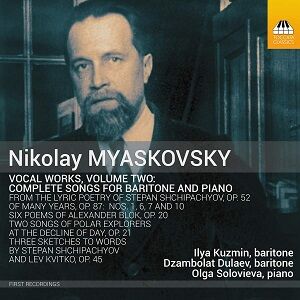
Nikolay Myaskovsky (1881-1950)
Vocal Works Volume Two – Complete Songs for Baritone and Piano
Six Poems of Alexander Blok, Op. 20 (1920)
At the Decline of Day: Three Sketches to words by Fyodor Tyutchev, Op. 21 (1922)
Three Sketches, Op. 45 (1938)
From the Lyric Poetry of Stepan Shchipachev, Op. 52 (1940)
Songs of Many Years, Op. 87: Nos. 1,6,7 and 10 (1901-36; revised 1950)
Two Songs of Polar Explorers (1939)
Ilya Kuzmin, Dzambolat Dulaev (baritone)
Olga Solovieva (piano)
rec. 2018-22, Concert Hall of the Academy of Choral Arts & Studio No. 1 of the Production Complex Tonstudio, Mosfilm, Moscow
Toccata Classics TOCC0667 [63]
Although Myaskovsky is renowned as a composer of symphonies, thirteen quartets and nine piano sonatas, his songs are almost completely ignored in the concert hall and in recordings – but they were important to the composer in his earliest years; three of his first four opuses were settings for the human voice. Of course, it was to the Russian poets that he turned for his inspiration, but he also composed to verses by Robert Burns and Shakespeare. The finest of the more than 150 songs are to texts by Lermontov, Blok, Tyutchev and the avant-garde modernist Zinaida Gippius.
First, I must correct what is said on the CD cover: these are not all first recordings, as several were recorded by Melodiya in the 1950s, and there have been recent digital recordings on different labels. The sole premiere recordings are the 1939 set of Two Songs of Polar Explorers and several of the Opus 87 Songs of Many Years from 1950. In addition, there are subtly different meanings from those the translator has chosen.
This is a very welcome release in Toccata’s second release of Myaskovsky’s vocal works. As with Volume 1 (review), they are impeccably recorded and performed, especially by the pianist Olga Solovieva who has championed many unfamiliar composers in recent years. The two baritones who share these sets of songs were previously unknown to me, but they portray every aspect of the tragic poetry and graceful settings.
The most original of all is the Opus 20 group of Six Poems of Alexander Blok, the finest settings here – every nuance of emotion is evinced by Ilya Kuzmin, and the lovely opening bars on the piano reveal how well these creations are suited to the intimacy of the drawing room. Another Romantic poet who inspired Myaskovsky was the 19th century Fyodor Tyutchev; his brief settings are over almost as soon as they begin, but are touching in their tender feeling and beauty of phrase.
The Ten Romances to words by the Soviet poet Stepan Shchipachyov from 1938 are in a similar style. The note claims these are ‘socialist realist’, yet the settings are about nature wildlife and a racehorse; the latter says, ‘When I gallop in the wild I feel as though I am flying…’ and the third stanza describes an eagle, ‘I build a nest in the mountain gorges’. These are touchingly performed by Kuzmin and Solovieva. Myaskovsky loved walking in the woods near Moscow and it is clear how dear these poems are to him. The Opus 52 collection is entitled ‘At the Spring’, ‘The Sunflower’, and another ‘It’s easy, my love, with you’. There is nothing political in these songs despite what Patrick Zuk’s notes imply.
At the end of his long career, Myaskovsky turned to several romances cast aside in his youth and revised them as the Opus 87 Songs of Many Years; most notable of them is the romance ‘Thus yearns the soul’ with words by Koltsov, ‘Thus yearns the soul, In the young breast! It wants freedom, It asks for a different life!’ These verses and another romance by Bryusov, ‘Our Orthodox chime sings and trumpets angelic chant’ are wonderfully sung by the North Ossetian Dzambolat Dulaev. Another verse is from Tyutchev’s translation of the Sonnet of Michelangelo, ‘Be silent, I pray, do not dare to wake me. O, in this evil and shameful age.’
Bringing the settings to a close is the Song of the Polar Sailors with words by Zelevinsky about the cruel, harsh nature of the arctic lands: ‘We love the icy expanses, and when the years of combat break out Our cruisers and battleships will sail.’ These are patriotic rather than ‘socialist’ songs.
The two singers deliver splendidly these challenging settings of Myaskovsky’s vocal cycles from the early and late stages of his career. Ilya Kuzmin studied with Valentina Levko in his home city and is a soloist at the Novaya Oper in Moscow. He has performed at La Scala, Berlin State Opera and regularly sings in both chamber and orchestral concerts. Dzambolat Dulaev studied in Moscow with Olga Mironova and is a soloist of the Bolshoi Opera Chamber Stage. Dulaev has performed at the Mariinsky Opera, and at Novaya Opera and regularly sings in chamber recitals. The pianist Olga Solovieva studied with Leonid Blok, and is a professor of the Gnessin Music College in Moscow. In 2002, Solovieva was awarded the ‘Best Accompanist’ Prize at the Moscow Tchaikovsky Competition.
The 28-page booklet in English provides notes on the composer and translations of the songs with biographies of the performers and photos of the composer and performers. I look forward to the third volume.
Gregor Tassie
Help us financially by purchasing from





















